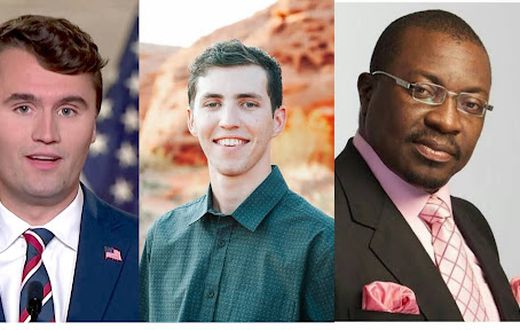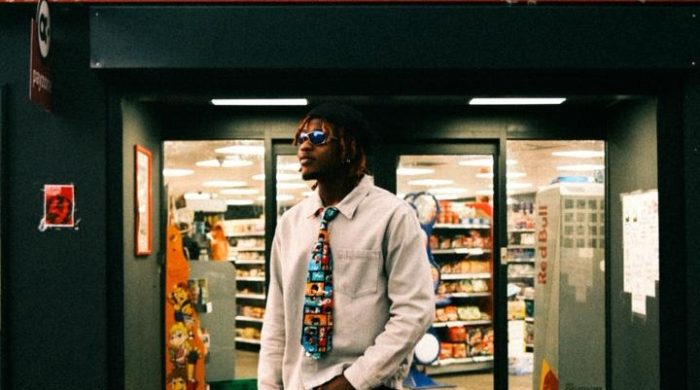Alibaba, one of Nigeria’s most iconic comedians, has voiced his thoughts after the widely reported shooting of American conservative activist Charlie Kirk, an incident that occurred as Kirk addressed an audience at Utah Valley University’s TPUSA event this Wednesday. Kirk’s sudden death has not just sent shockwaves across U.S. political circles but has also stirred conversations internationally, drawing attention in Africa where issues of violence and representation continue to fuel debate.
Describing the killing as a tragic loss of life, Alibaba was unequivocal in condemning the act, emphasizing that violence could never be justified. However, he also acknowledged an emotional nuance—an unexpected sense of relief—when it emerged that the suspected shooter was neither Black nor from an already marginalized community. His remarks illuminate how high-profile incidents abroad can trigger anxieties for Nigerians and West Africans about global perceptions and narratives tied to identity.
“It’s a saddening experience to see someone like Charlie Kirk lose his life in such a manner,” Alibaba told reporters.
“I absolutely stand against any form of killing or mob action. But honestly, when the news broke… the relief I felt knowing the alleged shooter wasn’t Black or linked to any group often unjustly blamed was immense. The consequences for our community—both at home and in the diaspora—could have been severe if the situation was different.”
According to official U.S. reports, authorities identified 22-year-old Tyler Robinson, a Utah native, as the suspect in Kirk’s shooting. Sources say Robinson, previously on a scholarship at Utah State University, had become more critical of polarizing public figures like Kirk in recent years. He is reported to have accused Kirk of “spreading hate” in his public commentary.
Investigators disclosed that Robinson, despite being raised in a staunchly conservative and pro-gun Republican family, distanced himself from their beliefs prior to the tragedy. His voter’s record reportedly lists him as nonpartisan and inactive, reflecting what analysts call a broader generational shift among American youth—one that also echoes political polarization seen around the world, including in Nigeria, where younger generations are increasingly distancing themselves from traditional power structures.
Since the shooting, the incident has become a focal point for debates not only about gun legislation but also about the intensifying divisions in American politics. In Nigeria and across West Africa, many are reflecting on what the case reveals about the global spread of violence and its wider implications. Similar sentiments were voiced in Utah, where Governor Spencer Cox publicly expressed that, following the incident, he hoped the shooter would turn out to be an outsider rather than a local—highlighting a universal fear of guilt by association many communities can relate to.
“For 33 hours, I kept praying that, if it had to happen here, it wouldn’t be one of us; maybe someone came from another state or country,” Governor Cox reportedly explained at a press briefing. “Unfortunately, that prayer was not answered. The event did occur here, and it was indeed one of our own.” His comments struck a chord with many Africans who live with the anxiety that incidents overseas could fuel stigmatization or backlash against their communities.
Alibaba’s honest reaction captures the sensitivity tied to international events that shape the perception of Africans globally. It raises questions about the double standards often present—how certain communities can become scapegoats for individual acts, and how one person’s actions may unfairly taint entire groups. Such concerns are not unique to Nigeria or Africa; minority populations worldwide often find themselves hoping, in the wake of violence, that the perpetrator does not share their race, religion, or background.
Broader Lessons: Political Violence and Identity in a Global Context
For many Nigerians—especially those with family abroad—the shooting highlights how fragile the social climate can become when identities are judged collectively. “It’s not just about America. If it happens there, the repercussions could be felt by anyone with a similar identity, even here in Lagos, Accra, or Johannesburg,” noted Prof. Bisi Olawale, an expert in African diaspora studies from the University of Lagos.
Local advocacy groups have echoed similar concerns, calling for more responsible global reporting and careful consideration of the consequences when linking violent incidents to broader communities. According to human rights advocate Gloria Mensah, “What happened in Utah is a tragedy, but we must learn from this. Media and governments have a responsibility to avoid fueling negative stereotypes that put innocent people at risk, whether they’re Africans, Muslims, or any marginalized group.”
The Nigerian Perspective: Understanding International Trends at Home
Nigeria, like the U.S., has long grappled with its own episodes of violence and social unrest. Issues of representation—whether in politics, media, or international relations—regularly dominate conversations, particularly among local youth. As Obi Chukwuma, a media consultant in Abuja, argues: “Every event like this is a lesson for us too. We’ve seen how violence abroad often leads to blanket judgments against whole communities, so it’s natural we feel a stake in how such stories are told.”
Statistics from the Pew Research Center indicate that people of African descent living in North America and Europe face increased discrimination in the aftermath of prominent crimes, regardless of actual connection. Such patterns underscore why Alibaba’s reaction has resonated with so many in West Africa.
A Call for Nuanced Conversation and Real Change
The killing of Charlie Kirk has once again thrust issues of political extremism, gun laws, and social identity to the fore—not just in America, but worldwide. For Nigerian audiences, the story is a powerful reminder to approach international developments with empathy and critical thinking, resisting easy narratives that stigmatize entire populations.
As discussions continue, commentators are urging both African and global leaders to focus on healing divisions and prioritizing justice and inclusion. “Our identity should never be the first thing put on trial,” said Lagos-based legal analyst Ayo Bamgbose. “Accountability for violence is necessary, but collective blame is never the answer.”
What lessons do you think Nigeria and other African nations can draw from such global incidents of violence? How can we ensure that international events are reported in ways that are fair to all communities? Drop your thoughts in the comments below, and follow us for the latest updates on global and local news that impacts Africa.
For general support, reach out anytime at support@nowahalazone.com.
Join our community:
Follow us on Facebook, X (Twitter), and Instagram for real-time updates and thought-provoking conversations!










